|
|
|
Sort Order |
|
|
|
Items / Page
|
|
|
|
|
|
|
| Srl | Item |
| 1 |
ID:
186999


|
|
|
|
|
| Summary/Abstract |
In 2022, Colombia decriminalized abortion, making it ostensibly a site of progressive abortion politics. Within hours, however, the ruling was met with intense, high-level backlash that positioned abortion as a threat to the Colombian family and gestured to gendered conflict harms past and present. Colombia's legal framework on abortion has emerged largely due to campaigning that unfolded during periods of intense political violence and insecurity, in a setting where conflict and (post-)conflict exist on a continuum. Combined, this points to the significance of (post-)conflict politics to understanding abortion politics, and vice versa, in the Colombian space. Here, we use interview data gathered in 2018 to argue that the two should be understood in tandem—and, indeed, that one cannot be properly understood without the other, shaped as they both are by a militant conservative nationalism inflected by religion, machismo and natalism, and by the material legacies of conflict. Decriminalization should therefore be understood as part of resurgent conservative reproductive governance, and abortion politics itself as an agonistic space of contestation rather than straightforwardly progressive. Beyond Colombia, it is also indicative of the rich insights on gender justice in conflict spaces that can be drawn from analysing abortion politics.
|
|
|
|
|
|
|
|
|
|
|
|
|
|
|
|
| 2 |
ID:
186986
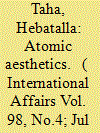

|
|
|
|
|
| Summary/Abstract |
How was the atomic age visualized in Egypt in the years immediately after the creation of the bomb? What role did gendered images, symbols and metaphors play in narrating and normalizing nuclear technology? How can these help us understand nuclear policy today? This article engages visual and textual media, including satirical magazines, cultural journals and film. It presents a plurality of images: the depiction of the bomb as an egg, as a miniscule and aesthetically pleasing object, alongside more alarming illustrations of the bomb as a monster. Through fluid and unstable visualizations, nationalist modernizers highlighted the ambivalence of nuclear technology, seen as containing potential for postcolonial rebirth and global death simultaneously. By exploring nuclear imaginaries from the decolonizing world, the article challenges the dominant narratives, histories and aesthetics of the atomic age. Despite the continuous reiteration of nuclear weapons as masculine in feminist International Relations, this conceptualization is not necessarily universal, and this research illustrates that feminizing nuclear imagery can still reinforce the nuclearized world. Considering visualization from, and not only of, the global South, the article emphasizes that people in non-nuclear weapons-possessing states also participated in the production of the nuclear-armed world and in discussions on the nuclear condition.
|
|
|
|
|
|
|
|
|
|
|
|
|
|
|
|
| 3 |
ID:
186995
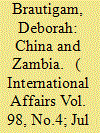

|
|
|
|
|
| Summary/Abstract |
Does Zambia's exceptionally high level of Chinese loan commitments provide insights into China's financial statecraft? Some have argued that Chinese lending to Zambia reflects China's purposeful use of loans to build leverage and perhaps acquire strategic assets. This article uses new data on Chinese loans, lenders and contractors and process-tracing to argue instead that Zambia is an extreme case of coordination problems in Chinese lending. Among all African countries with Chinese loans, Zambia has had the largest number of distinct Chinese lenders since 2000 (18) and the second largest number of different Chinese contractors winning Chinese loan-financed projects (29). This multiplication of stakeholders has created fierce and unregulated competition for infrastructure contracts in Zambia. In Beijing, ‘fragmented authoritarianism’ has meant an absence of top-down coordination of firms' and lenders' activities and thus few restraints. At the same time, Zambia's political leaders disregarded their own restraints on over-borrowing. Distinctive Chinese ideas about debt sustainability likely created additional disincentives for close Chinese monitoring. Finally, Zambia's history of frequent debt cancellations from China and other lenders likely exacerbated moral hazard risks.
|
|
|
|
|
|
|
|
|
|
|
|
|
|
|
|
| 4 |
ID:
186990


|
|
|
|
|
| Summary/Abstract |
The past decade has seen a push for ‘gender sensitive’ approaches within nuclear policy-making. Yet the significance of this approach, and how it understands ‘gender sensitivity’ are unclear and have not been studied. This article asks the question: how does work done on ‘gendering’ nuclear policy to date understand what a gender sensitive approach to nuclear weapons means and requires? The article provides an overview of the movement to include gender in nuclear policymaking before conducting an analysis of the discourse on gender in a core institution of nuclear politics, the Nuclear Non-Proliferation Treaty (NPT). Through qualitative analysis of five years of NPT texts, we find that dominant understandings of a ‘gender sensitive approach’ centre on the inclusion of women. We further find that there is almost no mention of men and masculinity in the NPT discourse; women are constructed as a homogenous category of outsiders; and women's inclusion is understood mainly as a means of increasing institutional efficiency. We suggest that the next steps in ‘gendering’ nuclear policy engage more with feminist policy analysis and the experiences of those already working within the policy space, and consider further how and if one can meaningfully link gender sensitive approaches to the practice of nuclear deterrence. The findings of this study also have significance beyond nuclear weapons, illuminating the broader dynamics and challenges of ‘gendering’ international security spaces.
|
|
|
|
|
|
|
|
|
|
|
|
|
|
|
|
| 5 |
ID:
186987


|
|
|
|
|
| Summary/Abstract |
This article makes an important theoretical and empirical contribution to the growing literature on nuclearism, using the case-study of India. Despite sustained criticism of and organized resistance to Indian nuclearism for decades, nuclear weapons and power continue to enjoy a high degree of legitimacy, often attributed in part to a lack of articulations of alternative pathways beyond the world-view of nuclearism. Against this backdrop, I argue that a potential starting point for such a conversation in India specifically can be found in the incipient Gandhian undercurrents within Indian anti-nuclear feminist activism. After highlighting the limitations of existing attempts to coalesce Gandhian and feminist strands, I argue that a feminist-Gandhian ethic can be built around the themes of intersubjective self, emotions and ahimsa on which both these strands converge. I then illustrate how such a feminist-Gandhian ethic could help move India beyond nuclearism thanks to its capacity to facilitate more effective disaster scripting and a counter-hegemonic cultural alternative and to legitimize non-exploitative and pluralistic forms of techno-science, before concluding with its policy implications in India and beyond. Besides the addition of a regional world-view under the purview of global International Relations, this work augments a nascent strand of post-western IR theorizing which critically interrogates the binaries of the West / non-West.
|
|
|
|
|
|
|
|
|
|
|
|
|
|
|
|
| 6 |
ID:
186989


|
|
|
|
|
| Summary/Abstract |
Contemporary developments in international affairs underscore the need for successful outcomes in the field of nuclear disarmament. However, feminist scholars have shown how linkages between masculinity and nuclear posturing continue to make disarmament appear as a policy of the weak, associated with emasculation and/or feminization. In this article I show how a feminist study of Swedish nuclear history has the potential to complicate, and disrupt, such linkages. Analysing a broad range of primary sources through a discourse analytical lens, the article shows how Sweden (re)constructed a white masculine self through its nuclear renunciation and disarmament engagement in the 1950s and 1960s. The article contributes with new insights about how gender, nuclear renunciation and disarmament interact; how lessons from the past can inform our understanding of disarmament dilemmas in the present; and the policy implications of such an analysis. Arguing that such knowledge is crucial for imaginative and transformative disarmament policy in the present, the article concludes that to reach a world free from nuclear weapons, it is crucial to expose, and challenge, those power relations that contribute to sustain a gendered and racialized nuclear order.
|
|
|
|
|
|
|
|
|
|
|
|
|
|
|
|
| 7 |
ID:
186998
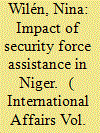

|
|
|
|
|
| Summary/Abstract |
How does Security Force Assistance (SFA) impact Niger's security sector and beyond? I draw on extensive fieldwork in Niger and identify and analyse two developments taking place in Niger's security sector: the development of an expanded Special Forces Command and the elaboration of multiple mobile hybrid units. I build upon, and contribute to, existing studies related to the politicization and securitization of borders in the Sahel and research discussing the blurring of borders between internal and external security forces. The aim is twofold: first, to unpack SFA efforts and effects through a focus on both geopolitical borders in Niger, and borders between and within corps and units in the security sector; and second, to contextualize and compare the developments in Niger's security sector with broader, global security trends. I find that both of the SFA projects constitute and feed into institutional games and inter-agency rivalry regarding task division, equipment and training. The overuse of the newly created Special Forces Command mirrors global trends of the latter as an ‘easy button to push’, while the multiplication of hybrid units to secure geopolitical borders reinforces the status and power of intermediary agencies that are at the interface between internal and external security forces. On an overarching level, the two trends of meddling with borders are found to be co-constituted by external and local actors who decide which developments that should be considered threats and how they should be addressed, questions that are deeply intertwined with power and control.
|
|
|
|
|
|
|
|
|
|
|
|
|
|
|
|
| 8 |
ID:
186985
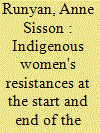

|
|
|
|
|
| Summary/Abstract |
By focusing attention on the beginning and end of the nuclear fuel chain, which mostly takes place on Indigenous lands, this article examines the gendered effects of uranium mining and nuclear waste dumping on North American Indigenous women and their resistances to these processes. In so doing, the article reveals how mining and dumping are made possible by the denial or deflection not only of Indigenous peoples' sovereignty over their lands, but also of Indigenous women's political and cultural authority and bodily autonomy. The article further shows how Indigenous women's reassertions of their nations' and their own self-determination through resurgent practices, like water-walking in the case of the Anishnaabe women, contribute significantly to the resolve of Indigenous nations to refuse to consent to further nuclear colonialism; an example of this is the case of the Saugeen Ojibway Nation's referendum that stopped the siting of the deep geological repository for nuclear waste on their territory. This case suggests it is incumbent on non-Indigenous feminist IR critics of nuclear politics to engage with Indigenous feminist thought and centre Indigenous women's resistances to the nuclear fuel chain, in order to address the consequences of nuclear waste dumping in anti-colonial, and socially and environmentally just, ways.
|
|
|
|
|
|
|
|
|
|
|
|
|
|
|
|
| 9 |
ID:
186992
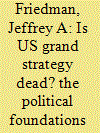

|
|
|
|
|
| Summary/Abstract |
International Relations scholars frequently warn that the American political system has become too fractured to sustain a coherent grand strategy. This perception generally rests on two premises: that President Donald Trump led an unprecedented assault on established principles of US foreign policy, and that Democrats and Republicans have become so polarized that they can no longer agree on a common vision for global leadership. By contrast, this article argues that the grand strategy of deep engagement retains robust bipartisan support. Even though President Trump rejected more expansive conceptions of liberal internationalism, his behaviour was largely consistent with deep engagement's principles. Moreover, when Trump departed from deep engagement—as with questioning the US commitment to NATO—his actions did not reflect voters' policy preferences. In fact, polling data indicate that public support for deep engagement is at least as strong today as it has been at any other point since the end of the Cold War. Altogether, the article thus demonstrates that the grand strategy of deep engagement is less embattled, and more politically viable, than the conventional wisdom suggests.
|
|
|
|
|
|
|
|
|
|
|
|
|
|
|
|
| 10 |
ID:
186988


|
|
|
|
|
| Summary/Abstract |
Sixty years after the Cuban Missile Crisis, academics and policy-makers still pore over the details for lessons in foreign policy. In those details, participants and observers regularly remark on the gendered dynamics of the crisis. Despite such observations and the vastness of the missile crisis literature, there remains little explicitly gendered research. This study takes up the feminist IR question ‘What work is gender doing here?’ by comparing the masculine performances of Khrushchev, Castro and Kennedy. It finds that the three leaders embraced similar masculine traits in themselves that they denied in each other and that gender operated as a preemptive deterrent to mindsets and approaches considered feminine, such as diplomacy and negotiation. The ongoing pursuit of masculinity, particularly toughness and cool-headed rationality, were powerful though underappreciated motivations that introduced biases and counterproductive decisions, whereas purportedly feminine options—cooperation and negotiation—were rejected out of hand, never arose, or were concealed from the public. Gender analysis of security events challenges claims to rationally-driven brinkmanship and the counterproductive limitation of options. As crisis unfolds, awareness of how gender can operate as a preemptive deterrent can serve to keep more options and negotiable details on the table.
|
|
|
|
|
|
|
|
|
|
|
|
|
|
|
|
| 11 |
ID:
186991


|
|
|
|
|
| Summary/Abstract |
This article expands feminist IR research on global nuclear politics by presenting a heretofore unassembled archive of Indigenous Pacific women's anti-nuclear poetry and by arguing for the importance of this poetry as a transformative mover of international discourse on nuclear imperialisms. Pacific activists, and especially women, have been some of the world's most active opponents to the global nuclear industrial complex, systematically working on the frontline of grassroots organizing in the Nuclear Free and Independent Pacific (NFIP) movement. Yet, the role played by Pacific women in the movement is understudied. To begin rectifying this omission, we chronologically retrace the evolution and the complexity of women's role in the global anti-nuclear movement by outlining the history of the development of anti-nuclear conferences in the 1970s understood alongside and also through Pacific women's poetic reflection on and activism against nuclearization in the Pacific. The poems by Pacific women presented in this article contribute to debates about nuclear politics in feminist IR and beyond, as they bring Pacific Islander voices into view and provide a more complex picture of Indigenous organizing, highlighting tensions based on gender and class within organizations such as the NFIP movement. In addition, these poems also contribute to ongoing challenges in IR to what constitutes valid forms of political discourse, by pushing back against the field's patriarchal tendency to favour administrative language and statistical reports at the expense of embodied knowledge and emotional experience. As such, this article also addresses broader questions of knowledge production in IR, particularly in the context of debates about decolonizing the field, and advocates for centring Indigenous knowledges of international politics.
|
|
|
|
|
|
|
|
|
|
|
|
|
|
|
|
| 12 |
ID:
186984


|
|
|
|
|
| Summary/Abstract |
This article serves as an introduction to the International Affairs special section, ‘Feminist interrogations of global nuclear politics’. In this article, we argue that feminist International Relations scholarship on the global nuclear order and its discontents should be revitalized, in ways that reckon more fully with the colonial matrix of power and its contemporary realignments. As the initial step in such a task, the first part of the article explores some of the distinctive insights that are generated about global nuclear politics by a feminist approach that takes coloniality seriously. We show that such an approach reconceptualizes nuclear destruction as a lived reality for many, within a broader history of domination; exposes the racialized, gendered and colonial dimensions of nuclear discourses; and casts fresh light on the material colonial relationships at the heart of the global nuclear order. In the second part, we reverse our focus to critically think through how the content of feminism, and its relation to coloniality and struggles for self-determination, might be understood differently if we start from a concern with global nuclear politics. The third and final part surveys the articles in the special section, highlighting where they pick up on the themes we have explored and some future lines of enquiry.
|
|
|
|
|
|
|
|
|
|
|
|
|
|
|
|
| 13 |
ID:
186996


|
|
|
|
|
| Summary/Abstract |
Technological shifts have made nascent nuclear arsenals more vulnerable. This article examines how this affects nuclear hedgers—that is, states deliberately seeking nuclear latency or the capability to develop the bomb. It argues that growing vulnerabilities provide hedgers with increasing incentives to acquire sophisticated ballistic missiles. Possession of missiles is crucial to limit the ‘window of vulnerability’ between a nuclear breakout decision and the attainment of a nuclear arsenal with deterrence value. The article illustrates this tendency through a case-study of the Iranian missile and rocket programs. It finds that missile acquisition has indeed been an integral part of Iran's hedging strategy, and that several of the systems it has acquired indicate an interest in nuclear weapons delivery. Furthermore, Iran's sophisticated missile arsenal significantly shortens its path to a credible nuclear deterrent. The article contributes to the proliferation literature, which has overlooked that the development of missiles is an increasingly important element of contemporary nuclear hedging. Its findings show that missiles increasingly need to be considered in scholarly assessments of states' nuclear latency and hedging, and in discussions about how difficult it is to acquire nuclear weapons. Moreover, the findings indicate that practitioners working to prevent proliferation should prioritize tracking missile programs.
|
|
|
|
|
|
|
|
|
|
|
|
|
|
|
|
| 14 |
ID:
186997
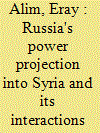

|
|
|
|
|
| Summary/Abstract |
By analysing Russia's engagements with Israel and Turkey in the Syrian theatre, this article sheds light on the kinds of interactions that may occur between an external great power and local states following the former's projection of power into the latter's region. The literature on power projection examines interactions between regional and extra-regional actors in the context of competition between great powers, thus overlooking interactions between great powers and non-great powers. Other literature, such as that on coercive diplomacy, does deal with this neglected issue, but it treats local states as the great power's target states. This, however, need not be the case, since great powers may engage local states while pursuing wholly different goals in a region. As this article illustrates, although Israel and Turkey have not been Russia's target states, Russia has frequently interacted with them to ensure that they refrain from acts harmful to its interests in Syria. Russia has succeeded in this endeavour, as local states have mostly complied with Russia's rules and restrictions while operating in Syria. When this was not the case, Russia introduced restrictive or punitive measures against Israel and Turkey, which enabled Moscow to keep the local environment conductive to its interests.
|
|
|
|
|
|
|
|
|
|
|
|
|
|
|
|
| 15 |
ID:
186994


|
|
|
|
|
| Summary/Abstract |
The Chinese government is fond of invoking the ‘hurt feelings of 1.4 billion Chinese citizens’ to protest foreign actions and policies. However, this rhetoric might be nothing more than propaganda and attempts to leverage nationalist sentiment. How much do citizens in China actually care about issues completely unrelated to their daily livelihoods? To answer this, the study employs a representative survey to investigate the extent to which rhetoric about ‘hurt feelings’ is consistent with public opinion on four contemporary socio-political disputes involving the NBA, Marriott International, Mercedes-Benz and the city of Prague. Across the scenarios, we found that the Chinese government did not exaggerate the displeasure of audiences—citizens are aware of the cases, were indeed upset by them and advocated for retaliatory measures that were surprisingly more forceful than those adopted in reality. These emotions were largely driven by nationalistic sentiment rather than personal experiences or encounters, suggesting the success of state propaganda in steering the public opinion toward outcomes favourable to the state. These findings support recent studies highlighting the peculiar case of rising nationalism in China, and have important implications for the impact of public opinion on Chinese policymaking.
|
|
|
|
|
|
|
|
|
|
|
|
|
|
|
|
| 16 |
ID:
186993
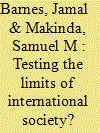

|
|
|
|
|
| Summary/Abstract |
When Australia reneged on a AUD$90 billion submarine contract with France in 2021 as it joined AUKUS, a new trilateral military partnership between Australia, the UK and the US, it was accused of lying and breaching France's trust. This perceived act of betrayal not only led to a deterioration in the diplomatic relationship between Australia and France, but it also drew attention to the consequences of violating the norm of pacta sunt servanda—agreements must be kept. Although it is recognized that breaches of trust undermine relationships, what has been underexplored is how a violation of norms can also undermine the presumption of trust in international society more broadly. Focusing on how Australia broke its contract with France after it joined AUKUS, this article argues that Australia's conduct not only harmed its relationship with France, but it also led the European Union (EU) to raise questions about how much to trust AUKUS partners as it engages in the Indo-Pacific region. It posits that adherence to international norms is important for developing trust between states in international society and has the potential to facilitate cooperation and enhance security in the complex Indo-Pacific region and beyond.
|
|
|
|
|
|
|
|
|
|
|
|
|
|
|
|
|
|
|
|
|